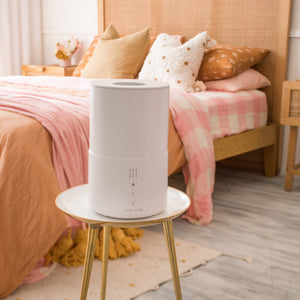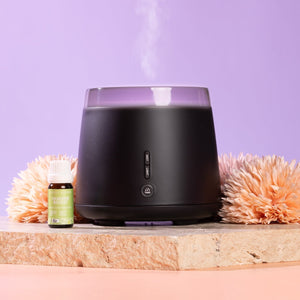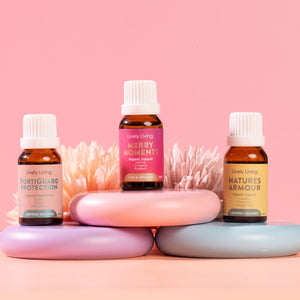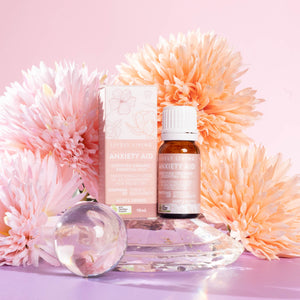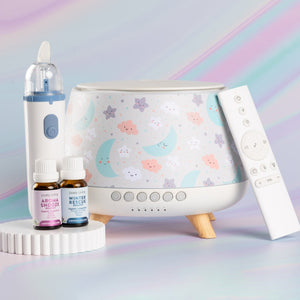6 Best Essential Oils for Sleep
Do you find yourself constantly counting sheep? Many struggle with getting a restful night's sleep and are interested in learning about the 6 best essential oils for sleep. You might even wonder if essential oils really work.
Many people find it hard to switch off at night. Using the 6 best essential oils for sleep can help calm your mind and promote good sleep.
Table Of Contents:
- Why a Good Night's Sleep Matters
-
The Science Behind Essential Oils and Sleep
- Top 6 Best Essential Oils for Sleep
-
Using Essential Oils Safely and Effectively
-
Creating an Optimal Sleep Environment
- FAQs about 6 best essential oils for sleep
- Conclusion
Why a Good Night's Sleep Matters
Sleep isn't just about feeling rested. It's needed for our overall health.
While we sleep, our bodies work to repair cells and restore energy. Not getting enough sleep can lead to several issues, impacting mood, and daily life.
Poor sleep weakens the immune system, and could make one more vulnerable to illness. It is important to find ways to aid sleep, like using essential oils or establishing a sleep schedule.
The Science Behind Essential Oils and Sleep
Essential oils are concentrated plant extracts. These natural remedies capture the plant's scent and beneficial properties.
Many essential oils contain compounds that have a direct impact on the nervous system. Some studies have shown a significant impact in reducing anxiety and improving quality of rest.
How Essential Oils Work
When you inhale essential oils, the molecules travel to the olfactory system. This part of the brain processes smells.
From there, signals are sent to other parts of the brain that control emotions and the nervous system. Certain oils, like lavender, contain linalool and linalyl acetate.
Research shows, these components help to reduce stress. These properties can also promote relaxation.
Top 6 Best Essential Oils for Sleep
Finding the right essential oil depends on different preferences. Here are six great oils.
Lavender Essential Oil
Lavender oil is well-known. The calming properties can help ease the mind.
This makes it one of the most popular essential oils for better rest. Research shows that lavender essential oil might decrease how long it takes to fall asleep.
Another study considered lavender as a substitute for anxiety drugs. Lavender essential oil offers calming support to help get a good night's rest.
Chamomile Essential Oil
Chamomile is often associated with tea. But it can also help those who struggle to nod off.
A 2010 study found participants who used chamomile experienced less anxious moments. Essential oils, including Chamomile, can help at night.
Ylang Ylang Essential Oil
Ylang Ylang has a sweet, floral aroma. This fragrance is often used in perfumes and essential oil blends.
It also carries benefits beyond its appealing smell, for calming nerves. Consider adding it to massage oils before sleep.

Bergamot Essential Oil
Bergamot provides a unique citrus aroma. Many find it both uplifting and calming.
If stressful thoughts keep you awake, Bergamot essential oil might be useful. It's found in Earl Grey tea for that citrus touch.
Clary Sage Essential Oil
Clary sage differs from common garden sage. Clary sage essential oil offers calming properties and may act as a sleep aid.
Clary sage may reduce tension, thus improve moods. Consider Clary Sage oil when life feels overwhelming and impacting the nightly rest.

Cedarwood Essential Oil
Cedarwood's earthy scent reminds some of forests. Cedarwood essential oil is helpful in stressful times, to unwind and ease tension.
Cedarwood oil might give a feeling of grounding. An old 2003 study with rats found that cedarwood oil had sedative effects, promoting improved sleep.
Using Essential Oils Safely and Effectively
Essential oils offer therapeutic help. They need to be used with proper understanding to experience safe benefits.
Before applying an essential oil, dilute it properly. Pure essential oils directly on the skin could cause problems for some.
Different Methods of Application
Diffusing is popular because it allows the oil to fill a space with a consistent fragrance. Start with a few drops in an ultrasonic diffuser; 3-5 is plenty.
Apply directly to the skin, a carrier oil, such as jojoba is a need first. Always check the instructions, to help stay away from any skin reaction, and promote relaxation.
Another simple method is putting essential oil on fabrics, like bedding. This provides the benefits through the night. This method can help with staying asleep.
| Application Method | Amount of Essential Oil | Carrier Oil or Base |
|---|---|---|
| Diffuser | 3-5 drops | Water (amount based on diffuser instructions) |
| Topical Application (Skin) | 1-2 drops per teaspoon | Carrier oil (jojoba, almond, or coconut oil) |
| Pillow/Fabric | 1-2 drops | None (apply to fabric, not directly to skin) |
| Massage Oil | 3-5 drops per tablespoon | Carrier Oil like almond or grapeseed oil. |
Creating an Optimal Sleep Environment
Incorporating essential oils can complement other habits. Develop a relaxing nightly process to promote good sleep.
Staying consistent with routines signal the body that rest is soon. Create a sleep schedule, maintain a quiet space, and stick to that routine, even on days off.
Beyond Essential Oils: Other Lifestyle Tips
Limit things like bright screens right before sleeping. Doing this helps calm and prepare to fully switch off for the night, working with your internal clock.
Staying active is generally beneficial. Regular, gentle exercises like walking could also improve nighttime sleeping and promote sleep.
Keeping a sleep diary could be a useful tool. You are able to track your habits and how much they improve your sleep quality.
FAQs about 6 best essential oils for sleep
What is the strongest essential oil for sleep?
Lavender is often thought to be among the strongest essential oils. Research consistently supports its potential as an aid for a restful night's sleep.
Which oil is best for a bed?
Lavender is great because of calming properties. Just make sure it's diluted and properly applied to avoid sensitivity issues on your bed increased area.
Which oil is good for deep sleep?
Cedarwood has grounding properties. It can assist those to reach that sought after deeper rest state, improving sleep time.
Which essential oil is a sedative?
Chamomile is often considered for soothing qualities. It's commonly known for aiding relaxation that is used in many popular tea varieties. It may promote relaxation as well.
Conclusion
You need rest to fully handle each new day and improve daily life. Addressing difficulty in quality nighttime sleep may seem frustrating, and hard, impacting your sleep quality.
However, essential oils can be a tool to improve mood. When incorporating the 6 best essential oils for sleep, this along with mindful lifestyle habits is a complete guide for better sleep.
The world around may seem filled with uncertainty. Getting a restful night's sleep is possible with the right essential oil blends and support, so you can feel refreshed.











